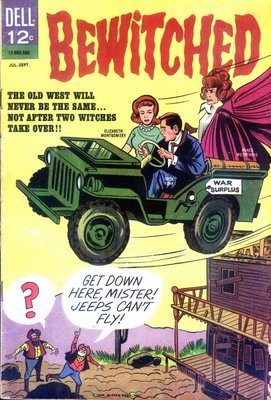The FBI’s War On Comics!
The war on freedom continues apace: Now the FBI is raiding and shutting down HTMLcomics.com, just because it illegally posted scans of thousands of comic books owned by all the major (and minor) comics publishers. What’s the world coming to when the Man is putting its boot down on the neck of guys whose only crime is breaking the law?
Share
The war on freedom continues apace: Now the FBI is raiding and shutting down HTMLcomics.com, just because it illegally posted scans of thousands of comic books owned by all the major (and minor) comics publishers. What’s the world coming to when the Man is putting its boot down on the neck of guys whose only crime is breaking the law?
Seriously, though, I enjoyed the site while knowing it was the most illegal site around, and I was stunned that it took this long for it to be taken down. The creator of the site offered a crazy but vaguely plausible-sounding (until you thought about it for a milisecond, I mean) legal theory to explain why it was all totally legal: he claimed that because he was blocking readers from downloading the comics for themselves, it was not an illegal download site but the comics equivalent of a lending library. Apart, I mean, from the fact that libraries can’t actually do what he did or anything like it.
Here’s his post on Findlaw.com where he lays out his overall plan (via one of the comics creators who was p.o’d at what he was doing), which was to hopefully make the site so popular that he could sell it for lots of money. Again, since he had no right to post any of the material, I’m not sure how he hoped to make it valuable. The fun part of it is the comments, where people try over and over to explain to him that there is no way to claim that the site is legal.
As I said, I enjoyed the site, in the same way that I enjoy watching old shows on YouTube or finding TV and movie clips to illustrate a post. I know there is no legal right for the material to be there, and fully accept the copyright holder’s right to have it pulled. (There isn’t even a sliver of an argument, as with the Downfall videos, that the work has been transformed rather than copied — and I agree with those who say that even that argument would not actually hold up.) What made that site valuable was that it presented a lot of old comics that are not available legally in any form, unless you can buy a used copy, and you usually can’t. If you’re looking for, say, those Dell comics based on popular ’60s live-action television shows, that was the place to find them.
What made the site certain to be shut down was that along with the old and unavailable comics, it had new comics, or comics that had been re-released online, for a fee, by the company. So it was directly competing with the owner. Now, it isn’t less illegal to post something that is otherwise unavailable. But something like that, as long as no money changes hands, is more likely to be overlooked or even winked at by the company that owns it.
If the success of that site — 1.6 million hits a day would certainly indicate that the first stage of his plan, making a popular site, was achieved — teaches the companies anything, it’s that there is a market for older material online, and that they should hurry up with digitizing more of their older comics and television shows. But of course, that’s not as easy as it sounds: what is cheap to do illegally is expensive to do legally. (For TV, you have to clear the show with everybody who owns a piece of the royalties, clear the music, and so on. For comics, you actually have to pay someone to scan the pages.) Which is why there’ll always be plenty of stuff that can’t be viewed in an official way, and why things like bootleg DVDs of old TV shows will continue to exist.
